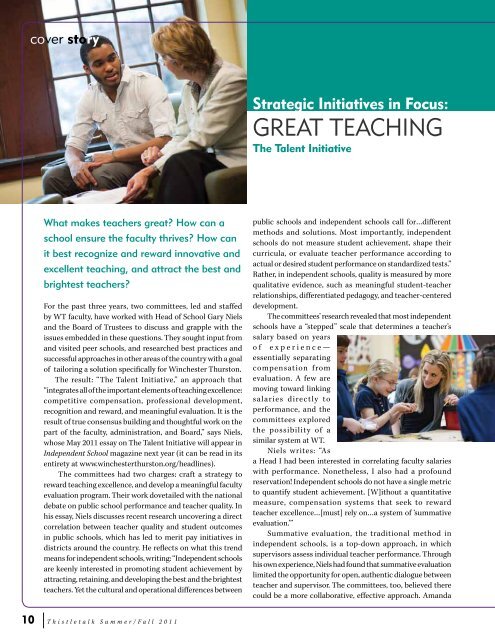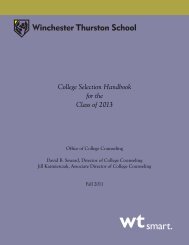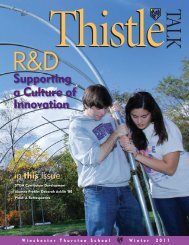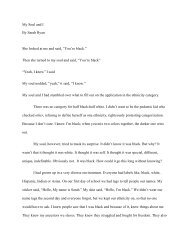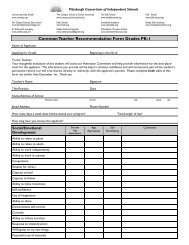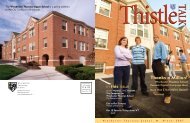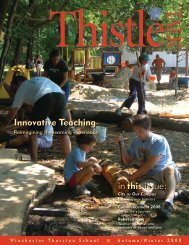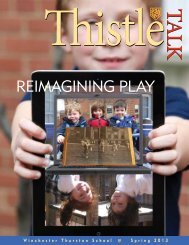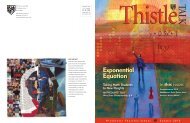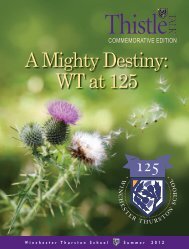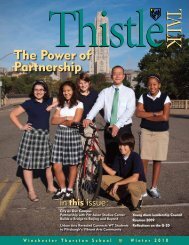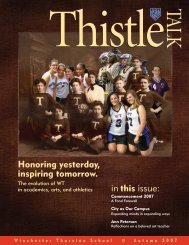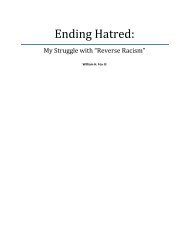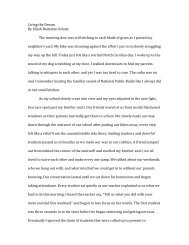From the Pillared Portals to a Brilliant World - Winchester Thurston ...
From the Pillared Portals to a Brilliant World - Winchester Thurston ...
From the Pillared Portals to a Brilliant World - Winchester Thurston ...
- No tags were found...
You also want an ePaper? Increase the reach of your titles
YUMPU automatically turns print PDFs into web optimized ePapers that Google loves.
cover s<strong>to</strong>ry<br />
Strategic Initiatives in Focus:<br />
GREAT TEAchinG<br />
The Talent Initiative<br />
What makes teachers great How can a<br />
school ensure <strong>the</strong> faculty thrives How can<br />
it best recognize and reward innovative and<br />
excellent teaching, and attract <strong>the</strong> best and<br />
brightest teachers<br />
For <strong>the</strong> past three years, two committees, led and staffed<br />
by WT faculty, have worked with Head of School Gary Niels<br />
and <strong>the</strong> Board of Trustees <strong>to</strong> discuss and grapple with <strong>the</strong><br />
issues embedded in <strong>the</strong>se questions. They sought input from<br />
and visited peer schools, and researched best practices and<br />
successful approaches in o<strong>the</strong>r areas of <strong>the</strong> country with a goal<br />
of tailoring a solution specifically for <strong>Winchester</strong> Thurs<strong>to</strong>n.<br />
The result: “The Talent Initiative,” an approach that<br />
“integrates all of <strong>the</strong> important elements of teaching excellence:<br />
competitive compensation, professional development,<br />
recognition and reward, and meaningful evaluation. It is <strong>the</strong><br />
result of true consensus building and thoughtful work on <strong>the</strong><br />
part of <strong>the</strong> faculty, administration, and Board,” says Niels,<br />
whose May 2011 essay on The Talent Initiative will appear in<br />
Independent School magazine next year (it can be read in its<br />
entirety at www.winchesterthurs<strong>to</strong>n.org/headlines).<br />
The committees had two charges: craft a strategy <strong>to</strong><br />
reward teaching excellence, and develop a meaningful faculty<br />
evaluation program. Their work dovetailed with <strong>the</strong> national<br />
debate on public school performance and teacher quality. In<br />
his essay, Niels discusses recent research uncovering a direct<br />
correlation between teacher quality and student outcomes<br />
in public schools, which has led <strong>to</strong> merit pay initiatives in<br />
districts around <strong>the</strong> country. He reflects on what this trend<br />
means for independent schools, writing: “Independent schools<br />
are keenly interested in promoting student achievement by<br />
attracting, retaining, and developing <strong>the</strong> best and <strong>the</strong> brightest<br />
teachers. Yet <strong>the</strong> cultural and operational differences between<br />
public schools and independent schools call for…different<br />
methods and solutions. Most importantly, independent<br />
schools do not measure student achievement, shape <strong>the</strong>ir<br />
curricula, or evaluate teacher performance according <strong>to</strong><br />
actual or desired student performance on standardized tests.”<br />
Ra<strong>the</strong>r, in independent schools, quality is measured by more<br />
qualitative evidence, such as meaningful student-teacher<br />
relationships, differentiated pedagogy, and teacher-centered<br />
development.<br />
The committees’ research revealed that most independent<br />
schools have a “stepped” scale that determines a teacher’s<br />
salary based on years<br />
o f e x p e r i e n c e —<br />
essentially separating<br />
compensation from<br />
evaluation. A few are<br />
moving <strong>to</strong>ward linking<br />
salaries directly <strong>to</strong><br />
performance, and <strong>the</strong><br />
committees explored<br />
<strong>the</strong> possibility of a<br />
similar system at WT.<br />
Niels writes: “As<br />
a Head I had been interested in correlating faculty salaries<br />
with performance. None<strong>the</strong>less, I also had a profound<br />
reservation! Independent schools do not have a single metric<br />
<strong>to</strong> quantify student achievement. [W]ithout a quantitative<br />
measure, compensation systems that seek <strong>to</strong> reward<br />
teacher excellence…[must] rely on…a system of ‘summative<br />
evaluation.’”<br />
Summative evaluation, <strong>the</strong> traditional method in<br />
independent schools, is a <strong>to</strong>p-down approach, in which<br />
supervisors assess individual teacher performance. Through<br />
his own experience, Niels had found that summative evaluation<br />
limited <strong>the</strong> opportunity for open, au<strong>the</strong>ntic dialogue between<br />
teacher and supervisor. The committees, <strong>to</strong>o, believed <strong>the</strong>re<br />
could be a more collaborative, effective approach. Amanda<br />
10 T h i s t l e t a l k S u m m e r / F a l l 2 0 1 1


